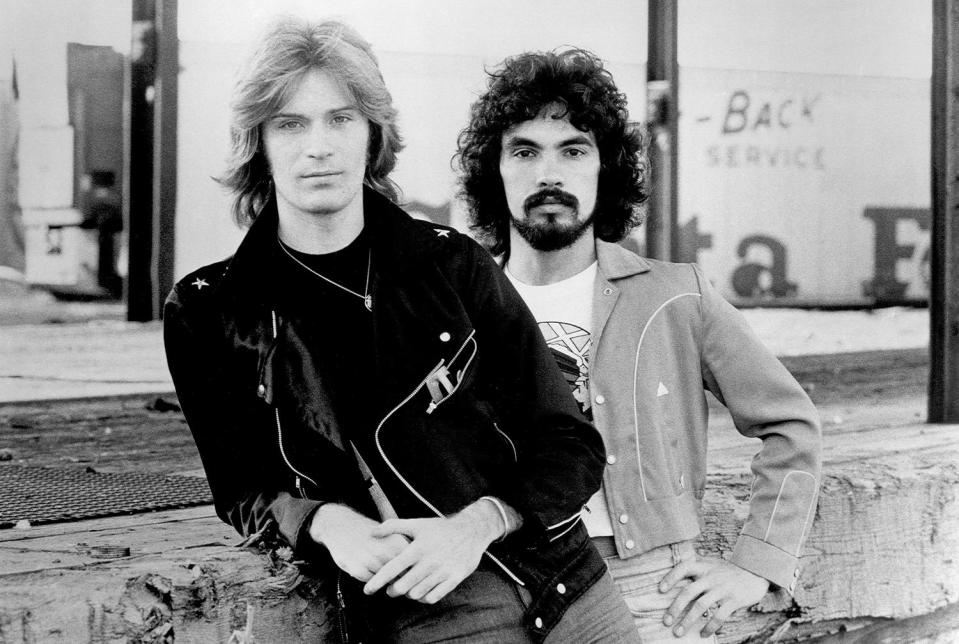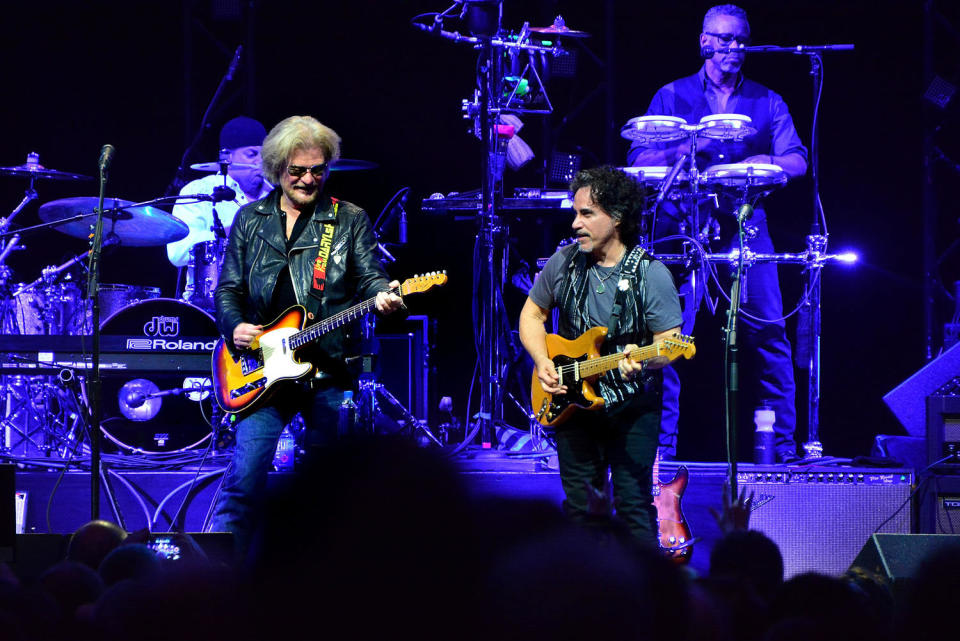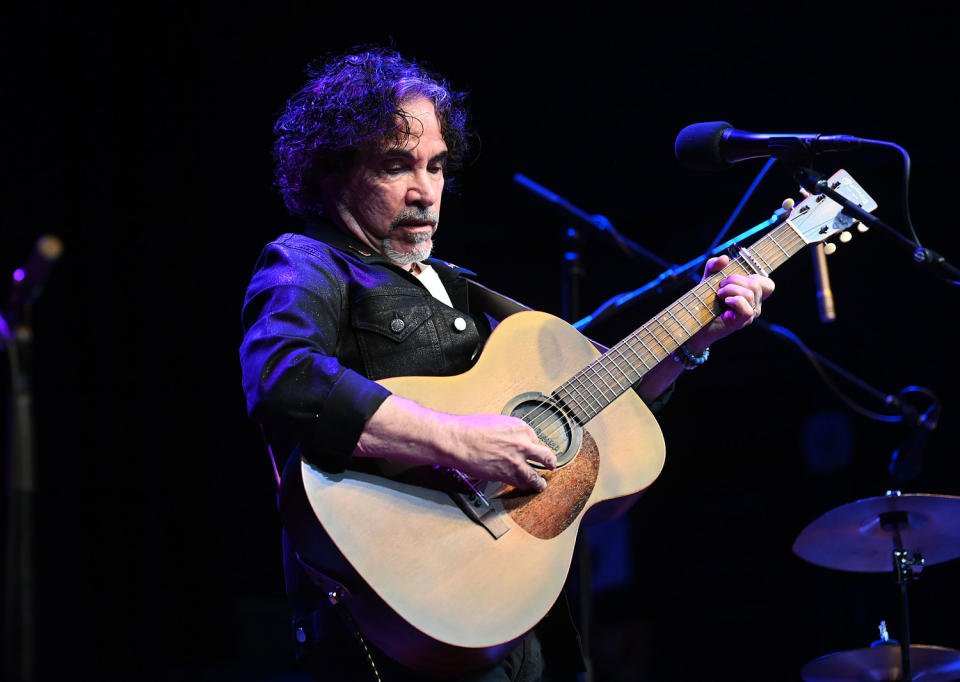John Oates talks ‘Reunion’ and the likelihood of one with Daryl Hall
- Oops!Something went wrong.Please try again later.
- Oops!Something went wrong.Please try again later.
It was 1974 when John Oates and Daryl Hall first landed on the Billboard Hot 100 with their hit single “She’s Gone.”
Five decades later, Oates says the song still remains one of his favorites.
“It’s a defining moment in my life, in songwriting, in my collaboration with Daryl Hall. And the fact that it put he and I on the map, into the world. And the fact that the song just sounds as good today as it did when it was written 50 years ago,” Oates tells TODAY.com.
Speaking in a video interview, the singer-songwriter says he still plays the classic tune at nearly every one of his shows, and that despite performing it hundreds, if not thousands, of times, it never gets old.
“That’s something to be said. So, I’m very proud of that,” says Oates.
At 76, Oates has just released “Reunion,” his latest solo album and, in many ways, a catharsis for the legendary musician whose longtime collaboration with Hall recently ended in a very public, headline-making split.
In late 2023, Hall sued Oates to prevent him from selling his share of their joint business venture, which includes the duo’s trademarks and record royalty income, among other assets.
“It’s a boring legal issue that’s really not worthy of making headlines. The fact that it was brought out into the public was unfortunate as far as I was concerned. It’s a business thing,” explains Oates.

Business aside, he’s much more interested in focusing on the latest chapter in his life, one that finds him free to pursue the kind of music that, to some degree, he tabled as one-half of Hall & Oates.
“(The music I was making prior to meeting Daryl) was roots music, acoustic, acoustic-oriented, some early R&B, but mostly folky and bluesy,” he says.
“When Daryl and I got together, we combined our two individual influences together to create something totally unique and new, that was unique to us as a duo,” Oates says.
It was those unique influences that led the pair to history-making success, spawning hit after hit in the ‘70s and ‘80s including “Sara Smile,” “Rich Girl,” “You’ve Lost That Lovin’ Feeling,” “Kiss On My List” and “You Make My Dreams,” among countless others.
By the ‘90s, however, their collaboration began to wane. Oates says that in the absence of making music with Hall, he began looking for other outlets, drawing him to Nashville, a place he would eventually call home.
“Very early on, I realized that there could be a musical home for me there, but I wasn’t quite ready to make the move,” he says.
But the idea of it stuck with him, and when the time came for Oates to find his “solo music identity,” one where he could see himself “being identified outside of the work I did with Daryl,” it was the Nashville music community and influence that brought him back to stay.
A result of that figurative homecoming is “Reunion,” an album Oates says is his most personal.

Finding his true identity in ‘Reunion’
“Every song on the album is intentional and has a connection,” says Oates, including the title track, “Reunion,” which he says was inspired by his dad, Al Oates.
“(It) was inspired by my 100-year-old father who told me, literally, that he was going to reunite with Mom, who had passed away previously. And I thought, ‘OK, what is the real meaning of the word ‘reunion?’” Oates asks.
It’s a question that ultimately led him to his own reunion of sorts.
“Not only was I referencing the next step in life, but I was also referencing a reuniting with myself about finding my true identity as a person and a musician,” he says. “And making sure that that was clear outside of the confines of working together with Daryl Hall and being perceived as some sort of group or duo or entity.”
Oates says the songs on the new album are a collection of tunes that were essentially, well, waiting to be collected.
“I didn’t write them in a six-month period or a year period — some of them go back into the ‘90s,” he says. Among the tracks, there’s a cover of John Prine’s “Long Monday” along with “All I Am,” a reflective song about his own mortality.
“When you make music that’s this personal, the anxiety that I have is, are people really going to understand it? Or is it too deep or is it too personal?” says Oates.
Either way, he says it’s OK because it’s what’s on his mind.
“Music should be fun and should be uplifting and it should make you smile,” he says. “But it should also make you think and it should make you cry and it should make you contemplate.”
He also puts to rest any speculation that “Reunion” is a thinly veiled allusion to his split with Hall.

“It was a total irony that that song also has that possible innuendo that there was going to be a Hall & Oates reunion. And it was totally not intended in any way,” he says.
“Really, the song was so emotionally important to me because of my dad and what he said. And it just happened to coincide with the legal wrangling. So, it’s just a weird coincidence.”
As far as a reunion with Hall is concerned, Oates firmly closes the door on the possibility.
“Daryl and I started as kids. We made a partnership based on our expectations and our lives 50 years ago. That partnership has outgrown itself. We’ve outgrown it, individually and collectively. It was time to change things and move on. And we didn’t agree on how to do that. So, therefore, we had a legal disagreement and it’s being worked out,” he says.
Are there any circumstances in which he’d consider reuniting?
“No. Not for me personally. I don’t know about Daryl. You’d have to ask him. I’ve outgrown the partnership. I’ve outgrown the collaboration and it’s time for me to move on,” says Oates.
“I’m very excited and I’m invigorated and energized by the potential that lies in front of me. And I want to make the most of my last years of creativity.”
For those still holding out hope that the pair will reunite, Hall said in a recent interview with Variety that it’s “correct” that the duo is finished.
As for Oates, his thoughts on a reconciliation are much the same. “Never can tell,” he says, “but I’m really happy right now.”
This article was originally published on TODAY.com

